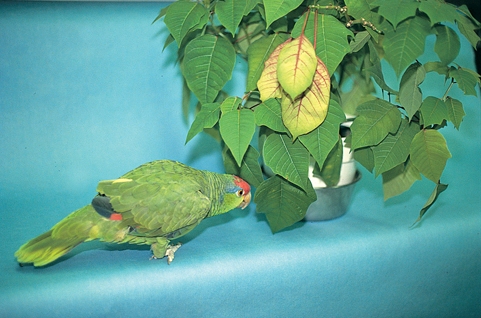Difference between revisions of "Avian Medicine Q&A 07"
Jump to navigation
Jump to search
(Created page with "<br style="clear:both;" /> {| align="left" width="100%" style="background-color:#04B4AE" |- | align="center" | 90px|Mansonlogo | align="left" | This ques...") |
|||
| Line 3: | Line 3: | ||
|- | |- | ||
| align="center" | [[File:Manson_logo.gif|90px|Mansonlogo]] | | align="center" | [[File:Manson_logo.gif|90px|Mansonlogo]] | ||
| − | | align="left" | This question was provided by [[:Category:Manson|Manson Publishing]] as part of the [[OVAL Project]]. See more [[Category: Avian Medicine Q&A|Avian Medicine questions]] | + | | align="left" | This question was provided by [[:Category:Manson|Manson Publishing]] as part of the [[OVAL Project]]. See more [[:Category: Avian Medicine Q&A|Avian Medicine questions]] |
|} | |} | ||
<br><br><br> | <br><br><br> | ||
| Line 18: | Line 18: | ||
The frequency of clinical toxicosis from plant ingestion is rare. Most parrots just chew or shred the plant rather than ingest it. Any part of the plant may be toxic, e.g. the leaves or fruit. | The frequency of clinical toxicosis from plant ingestion is rare. Most parrots just chew or shred the plant rather than ingest it. Any part of the plant may be toxic, e.g. the leaves or fruit. | ||
| − | |l1= | + | |l1=House Plant Toxicity |
|q2= What are the primary problems with inappropriate plant ingestion? | |q2= What are the primary problems with inappropriate plant ingestion? | ||
|a2= The primary problems with plant ingestion are oral irritation, regurgitation and diarrhoea. From clinical studies, there are very few plants that are proven toxic to birds but it is wise to look the plant up to check on any potential toxic effects. | |a2= The primary problems with plant ingestion are oral irritation, regurgitation and diarrhoea. From clinical studies, there are very few plants that are proven toxic to birds but it is wise to look the plant up to check on any potential toxic effects. | ||
| − | |l2= | + | |l2=House Plant Toxicity |
|q3= How would you treat the case? | |q3= How would you treat the case? | ||
|a3= Treatment would include: | |a3= Treatment would include: | ||
| Line 30: | Line 30: | ||
*Supportive therapy, including tube feeding and fluid therapy. The oral mucosa may have suffered local irritation. | *Supportive therapy, including tube feeding and fluid therapy. The oral mucosa may have suffered local irritation. | ||
| − | |l3= | + | |l3=House Plant Toxicity#Treatment Considerations |
</FlashCard> | </FlashCard> | ||
| Line 37: | Line 37: | ||
desc none}} | desc none}} | ||
[[Category: Avian Medicine Q&A]] | [[Category: Avian Medicine Q&A]] | ||
| − | |||
Latest revision as of 21:27, 2 August 2011
| This question was provided by Manson Publishing as part of the OVAL Project. See more Avian Medicine questions |
A pet bird owner calls your clinic because she found her bird chewing on a house plant. She is worried that it could be poisonous and does not know what to do.
| Question | Answer | Article | |
| What would the proper response be to this owner? | The proper response includes taking a full history:
The frequency of clinical toxicosis from plant ingestion is rare. Most parrots just chew or shred the plant rather than ingest it. Any part of the plant may be toxic, e.g. the leaves or fruit. |
Link to Article | |
| What are the primary problems with inappropriate plant ingestion? | The primary problems with plant ingestion are oral irritation, regurgitation and diarrhoea. From clinical studies, there are very few plants that are proven toxic to birds but it is wise to look the plant up to check on any potential toxic effects.
|
Link to Article | |
| How would you treat the case? | Treatment would include:
|
Link to Article | |
